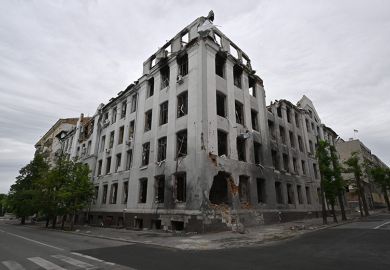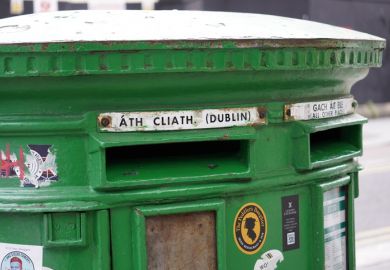Russia’s full-scale assault on Ukraine has changed the lives of many, not only in Ukraine but outside the country as well. Among those affected are scholars who study Russia – particularly its language and culture.
The invasion brought the interconnection of politics and culture into sudden sharp relief. How could the language of Pushkin be co-opted for the atrocious propaganda churned out by the Kremlin and its supporters? How could Lev Tolstoy’s preaching about non-violence fail to the extent that mass rapes and brutal torture have been conducted in the name of the “great Russian” nation? How could the culture of Dostoevsky perpetrate such brutalities?
Many cultural venues responded to the invasion by suspending performances of the Russian classics. But some scholars dismissed the idea that the classics could be in any way responsible for Russia’s invasion. This debate continues to rage in Russian studies. However, it is not the core of the issue. How historical Russian writers and artists viewed and presented Russia does matter, but the bigger issue for Russian studies to grapple with is about how the legacy of Russian writers and artists is taught to students and the public.
The Russian classics are not responsible for the Kremlin’s actions. But literature is political. Our choice of what to focus on when reading a text is political. For instance, Russia’s imperial ambitions have been known for centuries – and Russian writers comment on them in their own way.
Indeed, Russian writers have, at times, quite vigorously expressed ideas that contributed to the tenacity of their country’s chauvinistic attitudes towards its neighbours, including Ukrainians, Tatars, Chechens and Georgians. When reading Pushkin, Lermontov or Tolstoy, students could be introduced to how Russia viewed the Caucuses and its people under the Russian Empire, to help them better understand the challenges Russia still faces in Chechnya and the imperial ambitions that underlie its violations of Georgia’s territorial integrity and its occupation of Ukraine’s Crimea.
Yet such ideas have rarely been thoroughly explored in classrooms. Instead, Russian studies is dominated by the discussion of non-political issues, by attempts to understand “the mysterious Russian soul”. It is not comfortable to speak about the repulsive side of Russian history and its multiple manifestations in Russian culture. Indeed, Russian studies’ habit (perhaps even its mission) has been to sustain a positive image of Russia – which today aligns with Russia’s policy of promoting Russian culture abroad. The overuse of the concept of “greatness” when introducing Russian writers, artists, composers, musicians and ballet dancers is undeniable.
As the debate raged about whether Russian culture should be cancelled, I decided to ask my students for their views. They almost unanimously rejected cancellation “because Russian culture is great and its influence on world culture is profound”. But when I asked them to compare this influence with that of writers and artists from other countries, the conversation stumbled. My point was that, yes, Russian culture has remarkable pieces of art – but so does any other culture.
Saul Bellow supposedly once said, “When the Zulus produce a Tolstoy, we will read him.” This is the kind of cultural and racial arrogance that has persisted in the realm of Russian studies. Ukrainian by origin, I have witnessed this arrogance multiple times: “What did Ukraine contribute to world culture? What is Ukraine known for?” scholars and students ask me. “Is the Ukrainian language different from Russian?” they enquire – never the other way around. These are not only colonising statements. These are the statements of cultural supremacy that should have long been obsolete.
Recent enrolment surveys suggest that Russian programmes in North America and Europe are experiencing a considerable decline. At the same time, Polish and Ukrainian programmes are attracting more students than before. But are institutions responding quickly to this change of interest? Hardly. Although curricula have some flexibility to bring in more topics on Ukraine, programmes seem to proceed with extreme caution.
If the upsurge of interest in Ukraine continues, the minor changes that have occurred will presumably remain. But what if the interest subsidies? Will we go back to promoting the “greatness” of the country that attacked its neighbour because that neighbour chose freedom and democracy over Vladimir Putin’s evident desire to annihilate the notion of Ukraine as an independent country and of the Ukrainians as a people distinct from the Russians?
The job market has responded to students’ increasing interest in Ukraine even more slowly than curricula. Since the invasion on 24 February, I have seen no tenure-track positions advertised for Ukraine specialists. US universities did open their doors for displaced scholars from Ukraine, but vacancies in the field remain dominated by Russian studies. A few exceptions welcome another Slavic language or culture – and only in addition to Russian.
Changes are long overdue in Russian studies, but they are more urgent than ever now that students are seeking to understand how a country introduced to them as a “great culture” can commit crimes against humanity in its western neighbour – and how that neighbour, despite its much smaller size, is fighting so hard and so successfully to resist the prospect of being absorbed into the “Russian sea”.
Russian language and literature can offer some possible answers. But to meaningfully explore them, the field will have to decolonise itself.
Nataliya Shpylova-Saeed is a visiting assistant professor on the Russian and Eurasian studies programme at Colgate University in Hamilton, New York.
Register to continue
Why register?
- Registration is free and only takes a moment
- Once registered, you can read 3 articles a month
- Sign up for our newsletter
Subscribe
Or subscribe for unlimited access to:
- Unlimited access to news, views, insights & reviews
- Digital editions
- Digital access to THE’s university and college rankings analysis
Already registered or a current subscriber?








